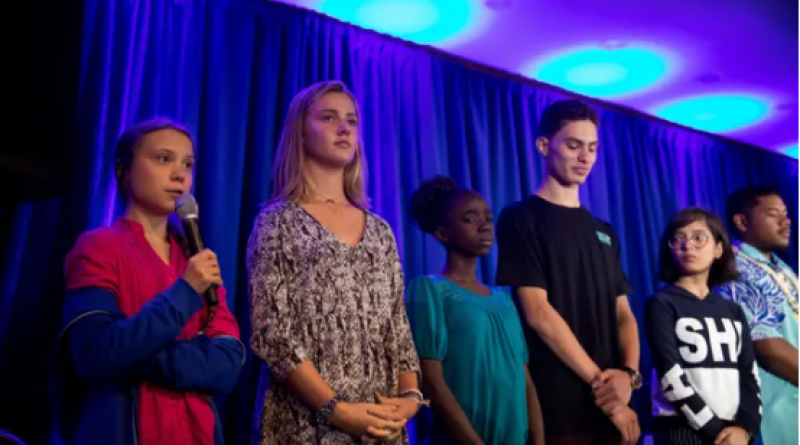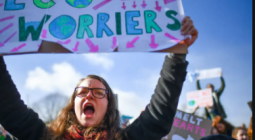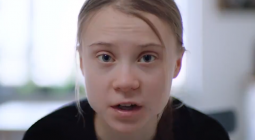Young climate activists vow to keep fighting despite UN setback

Children’s rights body rejects landmark case by group of activists including Greta Thunberg
A group of youth activists say they have been spurred to fight even harder after their landmark case arguing that countries perpetuating the climate crisis violate their human rights was rejected by a UN children’s rights body.
Greta Thunberg and 15 other activists from around the world filed their case accusing Argentina, Brazil, France, Germany and Turkey of violating their rights to life, health and culture under the convention on the rights of the child by failing to cut greenhouse gas emissions to levels that would restrict global warming to 1.5C, in accordance with the Paris agreement.
The Committee on the Rights of the Child accepted some of their arguments – including that states are legally responsible for the impact of emissions on children outside their borders and that the young people are victims of anticipated threats to their rights.
But with only weeks to go until the start of vital climate talks at Cop26, the UN body ruled their case was inadmissible and said it would not hear it until they had first taken it to individual national courts – a process that lawyers predict will take years.
The US climate activist Alexandria Villaseñor, who was one of the petitioners on the case, said she was shocked and angered by the result.
The 16-year-old, who started school striking when she was 13 outside the UN headquarters in New York, predicts it will encourage young activists to be even more vocal at Cop26.
“We are still going to be making our voices heard and if anything it’s made a lot of us even more upset and even more ready to make our voices heard,” she said. “So we’re not going to stop, but it definitely was a landmark in showing how much we have to put pressure and how much we have to push.”
The rejection of their case shows, she said, that world leaders are not doing enough to protect children’s rights. “And so that’s why at Cop there’s going to be so many children and these activists there who are going to be pushing our world leaders … because a lot of us are angry and we’re fed up with what has been happening.”
She said they would not give up on the case, adding: “The Committee on the Rights of the Child has not heard the last of it from the petitioners.”
Ayakha Melithafa, 19, a climate activist from Cape Town who was also a petitioner on the case, said she was devastated by the committee’s decision but was more determined than ever to keep fighting for her future.
“We’re on the wrong track and our political leaders must change course immediately,” she added. “Young people should not need to bring legal claims to hold them to account for promises made.”
Melithafa, whose mother is a small-scale farmer and was hugely affected by South Africa’s water crisis, said Cop26 would be a vital opportunity for activists to “stress the urgency of the climate crisis and that we need fast action right now”.
Scott Gilmore, a human rights lawyer at the law firm Hausfeld and lead counsel on the case, said that while the case had made significant progress in clarifying the state of the law, which he hoped they could use to influence national courts, the result was “a deeply disappointing dereliction of the committee’s duty”.
They are evaluating their legal options but he expects they will next go to the national courts before returning to the UN with their case – even though it could take as long as five years.
“Doing what the committee said these children need to do – exhaust domestic remedies – means spending years litigating these issues, on appeal, facing reversals until finally coming back to the UN and bringing exactly the same case that was filed in 2019,” he said. “Only this time, the evidence will be even worse, the threats will be even greater and the failures of these respondent states to take sufficient action will be even more pointed.”
The Committee on the Rights of the Child said the ruling advanced international law relating to extra-territorial jurisdiction and “keeps the door open” to other climate challenges in the future.
A spokesperson said the committee’s individual complaints mechanism “must comply with pre-established rules including that a complainant must first ‘exhaust domestic remedies’, ie bring his/her case before national jurisdictions.
“In this case, the committee held five oral hearings with the children’s legal representatives, the states’ representatives and third-party intervenors between May and September 2021. It also heard the children directly. During these hearings, it was clearly demonstrated that in the five countries concerned, there were judicial remedies available to children, including non-nationals, to address the issue of climate change.
“In the future, if these children (or other children), supported by their legal representatives have already sought remedies at the domestic level, or if they can show attempts to exhaust domestic remedies, then such cases may be declared admissible. The committee will continue to address the issue of climate change and children’s rights using various possible tools.”
20 October 2021
The Guardian




